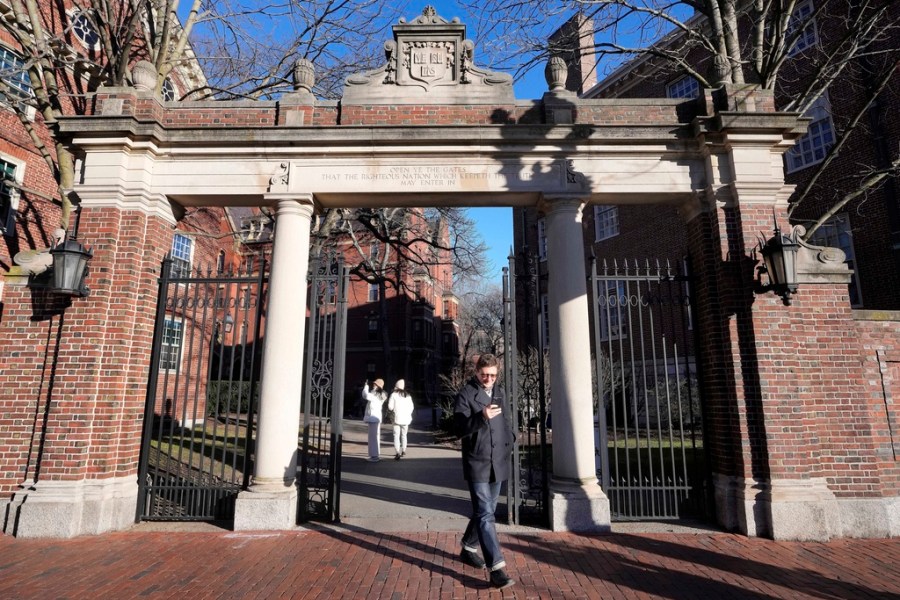
President Trump recently issued an executive order that purports to combat antisemitism by directing civil and criminal action against foreign students who participated in last year’s campus protests.
A related fact sheet, under the heading “Deport Hamas Sympathizers and Revoke Student Visas,” issues the following warning: “To all the resident aliens who joined in the pro-jihadist protests, we put you on notice: Come 2025, we will find you, and we will deport you.”
For more than a year, Republican leaders have defamed anti-war protesters as “antisemitic mobs.” Trump is sticking to the script. Why wouldn’t he? Feigned concern about antisemitism has offered Republicans a perfect tool to sow division and discredit the voices most likely to protest Trump’s assault on American democracy.
Unfortunately, some of our most powerful universities — ostensible defenders of democracy — are making the Republicans’ bad-faith talking points look like good-faith concerns.
Roughly a week before Trump turned on foreign students, Harvard settled two antisemitism lawsuits. Harvard agreed to adopt the International Holocaust Remembrance Alliance’s working definition of antisemitism. Human rights organizations have long criticized the this definition because it conflates antisemitism with legitimate criticism of Israel. Experts highlight the organization’s examples of antisemitism, which include: “Denying the Jewish people their right to self-determination, e.g., by claiming that the existence of a State of Israel is a racist endeavor.”
Even Kenneth Stern, who drafted the definition, cautions against adopting the definition because “right-wing Jewish groups … decided to weaponize it” on university campuses.
Keep in mind: framing anti-Zionism as “presumptively antisemitic” has been a go-to tactic to silence students and professors for years. Last spring, I co-authored a letter urging Congress to reject the Antisemitism Awareness Act, a Republican effort to codify the International Holocaust Remembrance Alliance definition into federal law. Over 1,300 Jewish faculty and multiple Jewish organizations signed on with a unified message: the definition would “delegitimize and silence Jewish Americans — among others — who advocate for Palestinian human rights or otherwise criticize Israeli policies.” Far from combating antisemitism, this is a recipe that “promises to amplify the real threats Jewish Americans already face.”
By adopting the International Holocaust Remembrance Alliance definition of antisemitism, Harvard adds legitimacy to Trump’s dangerous rhetoric. The inevitable consequence will be more politically motivated attacks aimed at my own students, my own colleagues and my university.
This is precisely what happened last October, when individuals tried to cancel a Boston University event about how universities can navigate the post-Oct. 7 landscape. Key to the campaign: labeling the keynote speaker — a Jewish scholar of social movements in the Middle East — an “antisemite.”
Harvard’s new policy invites more of these attacks and entrenches a hierarchy among its own Jewish community. The settlement includes the following FAQ: “For many Jewish people, Zionism is part of their Jewish identity. Conduct that would violate the Non-Discrimination Policy if targeting Jewish or Israeli people can also violate the policy if directed toward Zionists.”
The first sentence is accurate. But as a matter of anti-discrimination law — which I teach — converting a political ideology into a protected category raises serious concerns. What stops Trump from pointing to Harvard, our nation’s most prestigious university, and extending similar protections to white supremacists or neo-Nazis because, for some white Americans, white supremacy and Nazism is part of their White identity? It should be easy to see why Harvard’s decision to treat “political beliefs” as a “protected category” is troubling.
Harvard might claim that I am over-reading its policy. I presume Harvard does not intend to treat Nazis as a protected category. But from Harvard’s guidance, it is saying that Zionists are protected because Zionism is a political belief — or because for some Jews, that ideology cannot be severed from the person’s racial/ethnic identity. If it’s the latter, that just helps Trump target faculty — including Jewish professors — who criticize Israel or his own administration. This includes folks like Ken Levy, an LSU law school professor who was unconstitutionally suspended last month.
But Harvard knows Jews possess diverse political perspectives. The same policy gestures to this intra-group diversity when it explains that “Zionist, anti-Zionist, and non-Zionists are all protected.” Perhaps this is meant to reassure anti-war Jews that they can openly criticize Israel and Zionism without fear of punishment.
As a progressive Jew with views critical of both, I am not reassured. To begin, Harvard explains that various forms of “verbal … use of … anti-Zionist” speech could constitute harassment. That sounds like speech against Zionism could violate Harvard’s policy? Even if unintended, Harvard’s policy helps to seed a hierarchy among American Jews. Some of us will enjoy formal protection; the rest must suppress our genuine political commitments or face sanction.
Really, though, I’m less concerned about what Harvard does and more concerned about the precedent it sets. Trump’s desire to discredit, detain and deport pro-Palestine protesters is just the beginning. His ultimate aim appears to be rebranding the entire political Left as terrorists — and treat us as such. This strategy traces to the Heritage Foundation.
Notorious for Project 2025, Heritage also released “Project Esther,” the organization’s self-proclaimed “national strategy to combat antisemitism.” That document directs Trump to link pro-democracy and human rights organizations with Hamas under what Heritage dubs the “Hamas Support Network.” A parallel strategy animated a widely criticized bill the House failed to pass last fall. That bill would have granted Trump’s Treasury secretary unfettered discretion to strip the tax-exempt status of any U.S. non-profit it dubs a “terrorist-supporting organization.”
Trump’s campaign to quash diverse perspectives and free speech is just beginning. Harvard is helping him. I pray other universities don’t.
Jonathan Feingold is an associate professor of law at Boston University School of Law and a faculty affiliate at Rutgers Center for Security, Race and Rights. He is an expert in antidiscrimination law and a leading authority on right-wing discriminatory censorship laws that restrict teaching about racism, gender identity and related topics.












